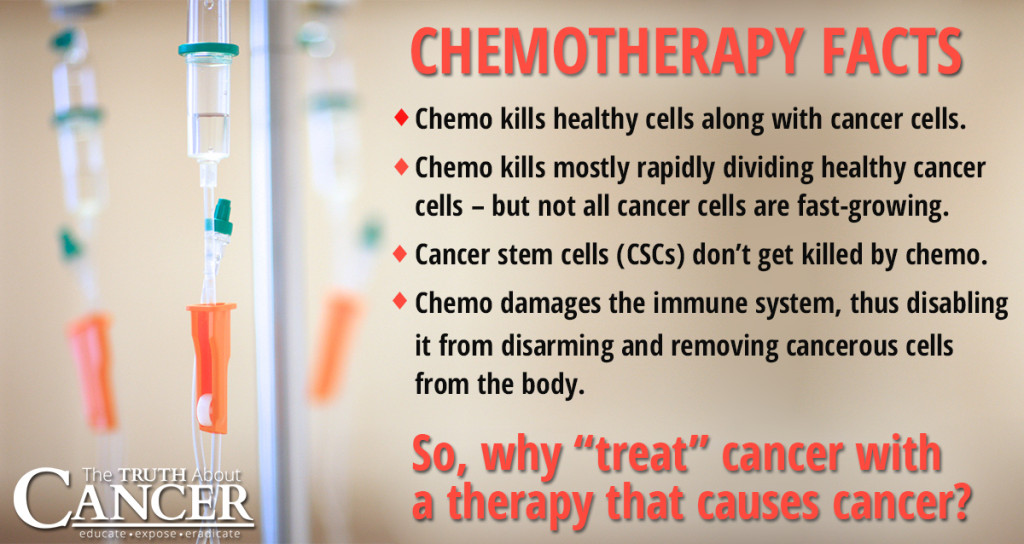12 Questions to Ask BEFORE Saying “Yes” to Chemotherapy Treatment
While
chemotherapy and radiation have long been considered the gold standard
for treating cancer, it’s not because they have been proven to cure
cancer. We tend to forget that science does not always represent “the
truth.” Instead, it is often artfully constructed to meet the needs of
the pharmaceutical industry and mainstream medicine.
Conventional doctors have considered chemotherapy treatment and radiation to be the standard of care for so long, they’ve lost sight of the fact that these treatments are causing cancer − not curing it. Did they somehow miss the fact that these super toxic cancer therapies could be the reason for their repeat customers?
Cancer stem cells (CSCs), a small population of cancer cells that are slow-growing and therefore resistant to treatment, do NOT die. To make matters worse, the treatment makes these cells even stronger in numbers as the ratio of highly malignant cells to benign cells begins to spiral out of control very soon after chemotherapy treatment ends.
These cells then take up residence elsewhere where they regenerate treatment-resistant tumors.
Chemotherapy also impairs the immune system, thus disabling it from disarming and removing cancerous cells from the body − so the patient is then more vulnerable to the recurrence of cancer.
It makes no sense to “treat” cancer with a therapy that causes cancer… does it?
Sometimes there is a benefit to chemo treatment (or radiation). For example, a very large tumor might need to be reduced in size if it is putting life-threatening pressure on a vital organ. Or if it is too large to be safely removed. However, just because you get an 80% reduction in tumor bulk, this does not mean you are targeting the most dangerous cells − the cancer stem cells.
If you are getting multiple opinions about how to treat your cancer, keep in mind that if you want apple juice, don’t go to a lemonade stand. They won’t sell it. Just like a conventional oncologist is not going to offer you alternative treatments. Chemo and radiation might well be the only tools in your allopathic oncologists’ medical toolbox.
I highly recommend seeking second and even third opinions in order to compare the various protocols available.

Conventional doctors have considered chemotherapy treatment and radiation to be the standard of care for so long, they’ve lost sight of the fact that these treatments are causing cancer − not curing it. Did they somehow miss the fact that these super toxic cancer therapies could be the reason for their repeat customers?
What You Need to Know About Chemotherapy Treatment
Chemotherapy is not efficient. It is not selective, meaning it kills healthy cells along with the cancer cells. This inflicts serious damage on the body. Plus, chemo kills mostly rapidly dividing healthy and cancer cells − but not all of the cells are fast-growing.Cancer stem cells (CSCs), a small population of cancer cells that are slow-growing and therefore resistant to treatment, do NOT die. To make matters worse, the treatment makes these cells even stronger in numbers as the ratio of highly malignant cells to benign cells begins to spiral out of control very soon after chemotherapy treatment ends.
These cells then take up residence elsewhere where they regenerate treatment-resistant tumors.
Chemotherapy also impairs the immune system, thus disabling it from disarming and removing cancerous cells from the body − so the patient is then more vulnerable to the recurrence of cancer.
It makes no sense to “treat” cancer with a therapy that causes cancer… does it?
Is Chemotherapy Treatment Effective?
Back in 2004, an Australian study on the effectiveness of chemo came up with rather bleak results. It showed an overall contribution of curative and adjuvant cytotoxic chemotherapy to 5-year survival in adults was barely over 2%. Given that chemo itself creates cancer, it’s a good thing they didn’t track the study a few more years, where they likely would have seen inverse results. Since then, numerous other studies point to the ineffectiveness of chemotherapy treatment.Sometimes there is a benefit to chemo treatment (or radiation). For example, a very large tumor might need to be reduced in size if it is putting life-threatening pressure on a vital organ. Or if it is too large to be safely removed. However, just because you get an 80% reduction in tumor bulk, this does not mean you are targeting the most dangerous cells − the cancer stem cells.
If you are getting multiple opinions about how to treat your cancer, keep in mind that if you want apple juice, don’t go to a lemonade stand. They won’t sell it. Just like a conventional oncologist is not going to offer you alternative treatments. Chemo and radiation might well be the only tools in your allopathic oncologists’ medical toolbox.
I highly recommend seeking second and even third opinions in order to compare the various protocols available.

Questions to Ask Your Oncologist About Chemotherapy Treatment
If you’re considering chemotherapy, here are 12 very important questions to ask your oncologist BEFORE you schedule any chemo treatments. The purpose of this list is to empower you to take charge of your cancer. No one is more interested in saving your life than you are, and this list will help you in making smart clinical decisions.- What is the goal of the chemo for my cancer? Is this a cure?
Doctors rarely use the word “cure.” Instead they say things like “remission” or discuss 5 and 10-year survival rates. Be clear on the expectations of a treatment plan. - What are the chances that the chemotherapy treatment will work for me, for my cancer? Again, know what goal you are looking to reach: a cure, tumor reduction, or removal of symptoms. Ask: “After the chemo will I be cured, in remission, or do you anticipate I will need further treatment?”
- What chemo-sensitivity testing will you do to determine which chemotherapy agent to use?
Despite the protestations of most oncologists, there is no one right treatment for any cancer. All the while, patients are given drugs that do not have the capacity to work for that particular person, often leading to failure and unnecessary suffering. Medical oncologists are increasingly encouraged to adhere to the standards defined by the National Comprehensive Cancer Network (NCCN) guidelines, regardless if the treatments even work or will work for the individual seeking treatment.These guidelines offer recommendations for treatments by diagnosis, based on the response for the “average” patient. But cancer patients are anything but average, and there are no average outcomes. Each cancer patient and each cancer has its own unique characteristics. Sensitivity testing takes some of the guesswork out of the equation by using specialized lab tests to predict how well a particular chemotherapy will work. - What is your opinion on taking supplements during treatment?
While most supplements are completely safe to take during treatment and can actually boost the efficacy of treatment, many allopathic (conventional) doctors have not been trained in this subject. - What are my other options if I decline treatment? You are asking this to uncover the doctor’s knowledge of available alternative therapies.
- What lifestyle changes will I need to make to improve the outcome of the treatment and protect my body during treatments?
- How will you nourish and protect my healthy cells while you’re killing my cancer cells?
Also ask how they recommend you detox from the chemotherapy treatment afterwards. - What will your proposed chemotherapy treatment do to my cancer stem cells?
- How will you support my immune system during treatment?
- What will you do if I become resistant to chemo treatment?
- How will this treatment change the cancer environment?
Ask if it will only kill the cancer that is there and leave you vulnerable to more cancer? Oncologists don’t always share that once the immune system is depressed, the cancer stem cells can go on to create more cancer. - Would you give this same chemotherapy treatment to your spouse or children, and if not, what would you give them? Would you take it yourself?
Article Summary
- Chemotherapy and radiation have long been considered the gold standard for treating cancer, but it’s not because they have been proven to cure cancer.
- Chemotherapy is not selective − it kills healthy cells along with the cancer cells, which causes serious damage to the body.
- Cancer stem cells (CSCs) are a small population of cancer cells that are slow-growing and are resistant to treatment. Chemotherapy does not kill off cancer stem cells. These cells then take up residence elsewhere where they regenerate treatment-resistant tumors.
- Chemotherapy also impairs the immune system, which then disables it from removing cancerous cells from the body. This makes the patient more vulnerable to cancer coming back.
- Most oncologists only recommend chemo, radiation, and surgery and are unlikely to recommend alternative and complementary treatments. Seek 2nd and even 3rd opinions in order to compare the various protocols available.
- If you’re considering chemotherapy, here are 12 important questions to ask your oncologist/doctor BEFORE you schedule any chemo treatments. These questions are to empower you to make smart clinical decisions for YOUR body.
- What is the goal of the chemo for my cancer? Is this a cure?
- What are the chances that the chemotherapy treatment will work for me, for my cancer?
- What chemo-sensitivity testing will you do to determine which chemotherapy agent to use?
- What is your opinion on taking supplements during treatment?
- What are my other options if I decline treatment?
- What lifestyle changes will I need to make to improve the outcome of the treatment and protect my body during treatments?
- How will you nourish and protect my healthy cells while you’re killing my cancer cells?
- What will your proposed chemotherapy treatment do to my cancer stem cells?
- How will you support my immune system during treatment?
- What will you do if I become resistant to chemo treatment?
- How will this treatment change the cancer environment?
- Would you give this same chemotherapy treatment to your spouse or children, and if not, what would you give them? Would you take it yourself?

No comments:
Post a Comment